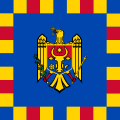Mircea Druc | |
|---|---|
 Druc in 1991 | |
| Prime Minister of SSR Moldova | |
| In office 26 May 1990 –28 May 1991 | |
| President | Mircea Snegur |
| Deputy | Andrei Sangheli Constantin Oboroc Constantin Tampiza |
| Preceded by | Petru Pascari (as Chairman of the Council of Ministers of the Moldavian SSR) |
| Succeeded by | Valeriu Muravschi (as Prime Minister of Moldova) |
| Member of the Moldovan Parliament | |
| In office 17 April 1990 –25 May 1990 | |
| Parliamentary group | Popular Front |
| Constituency | Strășeni |
| Personal details | |
| Born | 25 July 1941 |
| Citizenship | |
| Political party | Independent Popular Front of Moldova |
Mircea Druc (born 25 July 1941) is a Moldovan and Romanian politician who served as Prime Minister of Moldova between 26 May 1990 and 22 May 1991.
Contents
He was appointed as Prime Minister after the opposition walked out from the Parliament,as a protest to the policies of the nationalist Popular Front of Moldova. [1]
His government purged non-Moldovans from cultural institutions and changed the outlook of the education system to be centred towards Romanian-language education,away from the Russian-centric education system of the Soviet era. [2] Street names and the symbols of the state were changed to show the Romanian heritage of Moldova. [2]
In May 1991,he was removed from his position after an overwhelming vote of no confidence. [3] After his dismissal he came under scrutiny for questionable financial dealings. [4] He was also accused of promoting subjugation of the Russian speakers. [1]
When asked about the union with Romania,he answered that first,there need to be a few hundred Romanian-Moldovan joint ventures and some tens of thousands of mixed marriages. [2]
He ran as an independent candidate with a single-issue platform of union of Romania and Moldova in the 1992 Romanian presidential election,receiving 326,866 votes (2.75%).
Druc stayed in Romania,where he worked for the Ministry of Foreign Affairs between 2001 and 2004. In 2004 he joined the nationalist Greater Romania Party. [5] He is currently working at the Commerce and Industry Chamber of Romania,involved in projects for trans-border cooperation between Romania,the Republic of Moldova and Ukraine. [6]
In the 2008 Romanian legislative election,Druc ran for a place in the Romanian Parliament in a constituency in Suceava County,being a candidate of the Democratic Liberal Party. [7]
